The Basques are a Southwestern European ethnic group, characterised by the Basque language, a common culture and shared genetic ancestry to the ancient Vascones and Aquitanians. Basques are indigenous to, and primarily inhabit, an area traditionally known as the Basque Country —a region that is located around the western end of the Pyrenees on the coast of the Bay of Biscay and straddles parts of north-central Spain and south-western France.
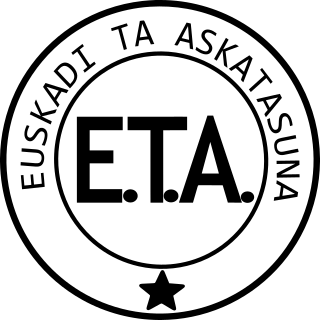
ETA, an acronym for Euskadi Ta Askatasuna, was an armed Basque nationalist and far-left separatist organization in the Basque Country between 1959 and 2018, with its goal being independence for the region. The group was founded in 1959 during the era of Francoist Spain, and later evolved from a pacifist group promoting traditional Basque culture to a violent paramilitary group. It engaged in a campaign of bombings, assassinations, and kidnappings throughout Spain and especially the Southern Basque Country against the regime, which was highly centralised and hostile to the expression of non-Castilian minority identities. ETA was the main group within the Basque National Liberation Movement and was the most important Basque participant in the Basque conflict.
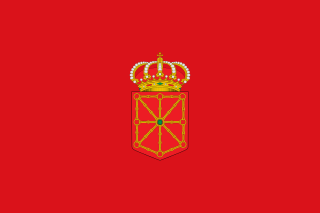
Navarre, officially the Chartered Community of Navarre, is a landlocked foral autonomous community and province in northern Spain, bordering the Basque Autonomous Community, La Rioja, and Aragon in Spain and Nouvelle-Aquitaine in France. The capital city is Pamplona. The present-day province makes up the majority of the territory of the medieval Kingdom of Navarre, a long-standing Pyrenean kingdom that occupied lands on both sides of the western Pyrenees, with its northernmost part, Lower Navarre, located in the southwest corner of France.

In Spain, a comarca is either a traditional territorial division without any formal basis, or a group of municipalities, legally defined by an autonomous community for the purpose of providing common local government services. In English, a comarca is equivalent to a district, county, area or zone.
Guardamar del Segura or briefly Guardamar is a municipality of the province of Alicante located at the mouth of the river Segura in southern Valencia, Spain. It is a Mediterranean resort, with a large pine forest abutting an 11-km-long white sand beach.

The Basque Country is the name given to the home of the Basque people. The Basque Country is located in the western Pyrenees, straddling the border between France and Spain on the coast of the Bay of Biscay.

Gipuzkoa is a province of Spain and a historical territory of the autonomous community of the Basque Country. Its capital city is Donostia-San Sebastián. Gipuzkoa shares borders with the French department of Pyrénées-Atlantiques at the northeast, with the province and autonomous community of Navarre at east, Biscay at west, Álava at southwest and the Bay of Biscay to its north. It is located at the easternmost extreme of the Cantabric Sea, in the Bay of Biscay. It has 66 kilometres of coast land.
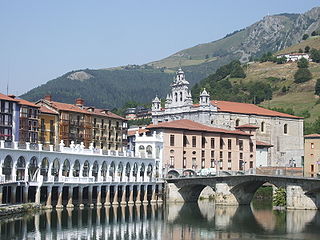
Tolosa is a town and municipality in the Basque province of Gipuzkoa, in northern Spain. It is located in the valley of the river Oria, next by Uzturre, a local mountain topped by a white cross.
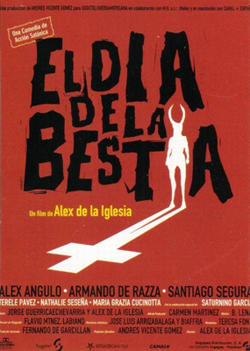
The Day of the Beast is a 1995 Spanish-Italian black comedy film co-written and directed by Álex de la Iglesia and starring Álex Angulo, Armando De Razza and Santiago Segura.
María Elisa Díaz de Mendibil Gómez de Segura is the representative of the government of the Basque Country Autonomous Community of Spain in Argentina.
The 2006 Tour of the Basque Country was the 46th Tour of the Basque Country road cycling race and was held over six stages from 3 April to 8 April 2006. It was won by Spaniard José Ángel Gómez Marchante of the Saunier Duval–Prodir cycling team.
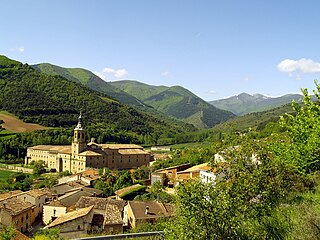
San Millán de la Cogolla is a sparsely populated municipality in La Rioja, (Spain). The village is famous for its twin monasteries, Yuso and Suso, which were declared a World Heritage Site in 1997. There were 293 inhabitants registered in 2009, the population having fallen significantly during the twentieth century.
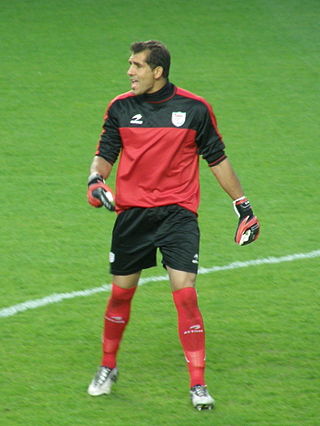
Gorka Iraizoz Moreno is a Spanish former footballer who played as a goalkeeper.
Etxeberria (Basque pronunciation:[etʃeβeri.a], modern Basque spelling) is a Basque language placename and surname from the Basque Country in Spain and France, meaning 'the new house'. It shows one meaningful variant, Etxeberri (no Basque article –a, 'the'), and a number of later spelling variants produced in Spanish and other languages. Etxebarri(a) is a western Basque dialectal variant, with the same etymology. Etxarri (Echarri) is attested as stemming from Etxaberri.
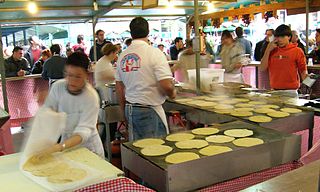
Talo or Talau is a typical food of the Basque Country, similar to the traditional corn tortilla of Mesoamerica, made of corn flour, water and a bit of salt. It is round and is cooked in a warm metal plank, named a talo burni. It can be eaten alone, with various toppings, and is also used as a wrap for various foods.
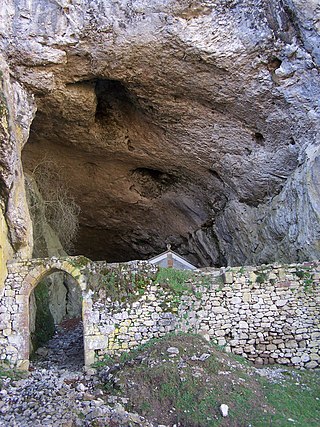
The San Adrian tunnel or Lizarrate represents the most outstanding milestone in the historic inland Basque route of the Way of St. James. It consists of a natural cave carved by water erosion in the rock with an opening on either side north and south; it also holds a hermitage inside. The tunnel provides a natural passage dividing the provinces of Gipuzkoa and Álava/Araba.

The Basque Country, also called the Basque Autonomous Community, is an autonomous community in northern Spain. It includes the Basque provinces of Álava, Biscay, and Gipuzkoa. It also surrounds an enclave called Treviño, which belongs to the neighboring autonomous community of Castile and León.
Agustín Gómez de Segura Pagóla was a footballer who played as a left back. Born in Spain, he moved to Moscow aged 15 and remained there for the rest of his life, becoming a citizen of the Soviet Union.
The assassination of Augusto Unceta Barrenechea was an attack by the Basque separatist group ETA which took place on 8 October 1977 in Guernica in the Basque Country in northern Spain.















